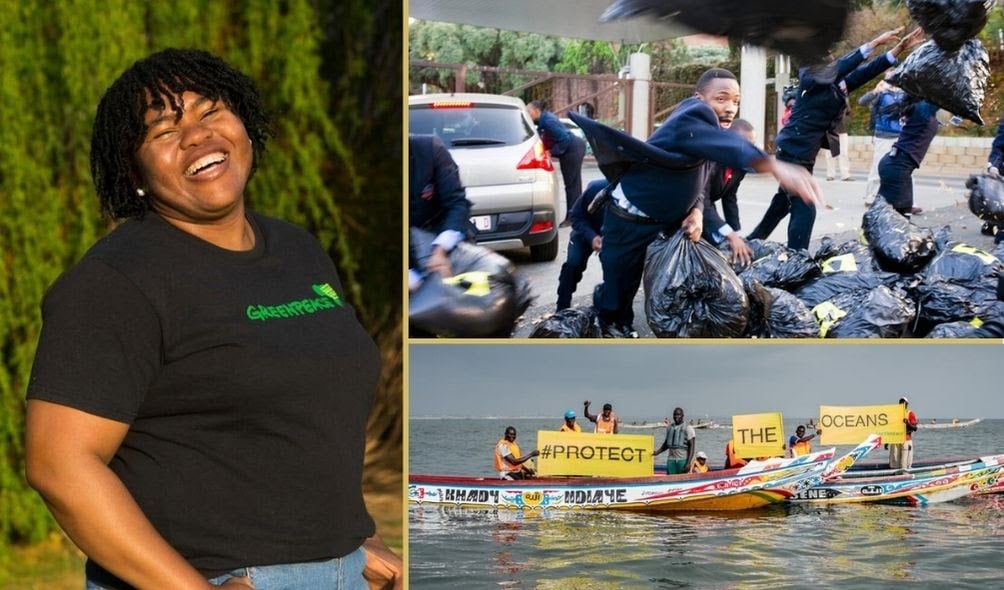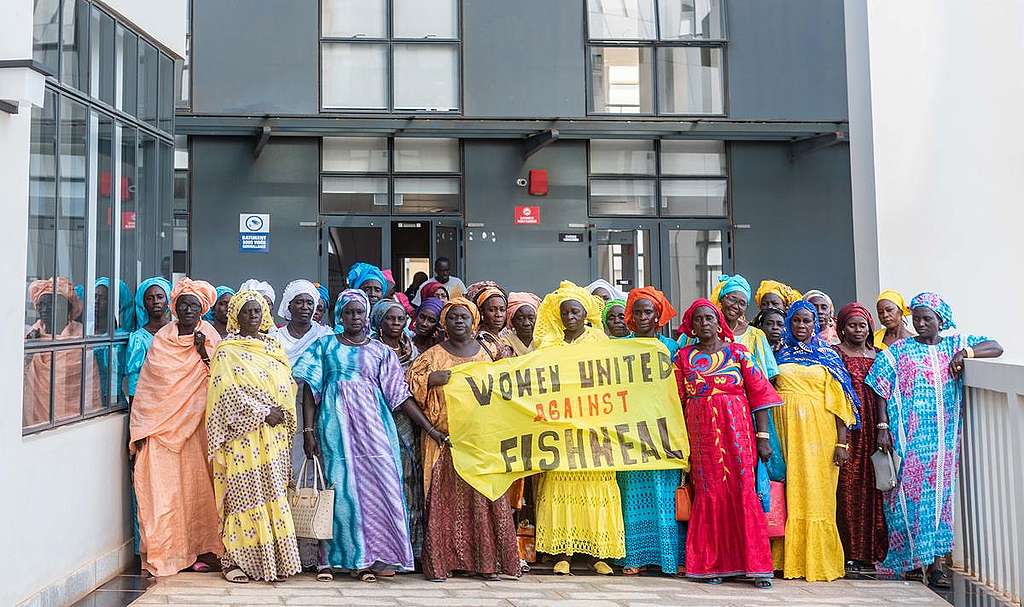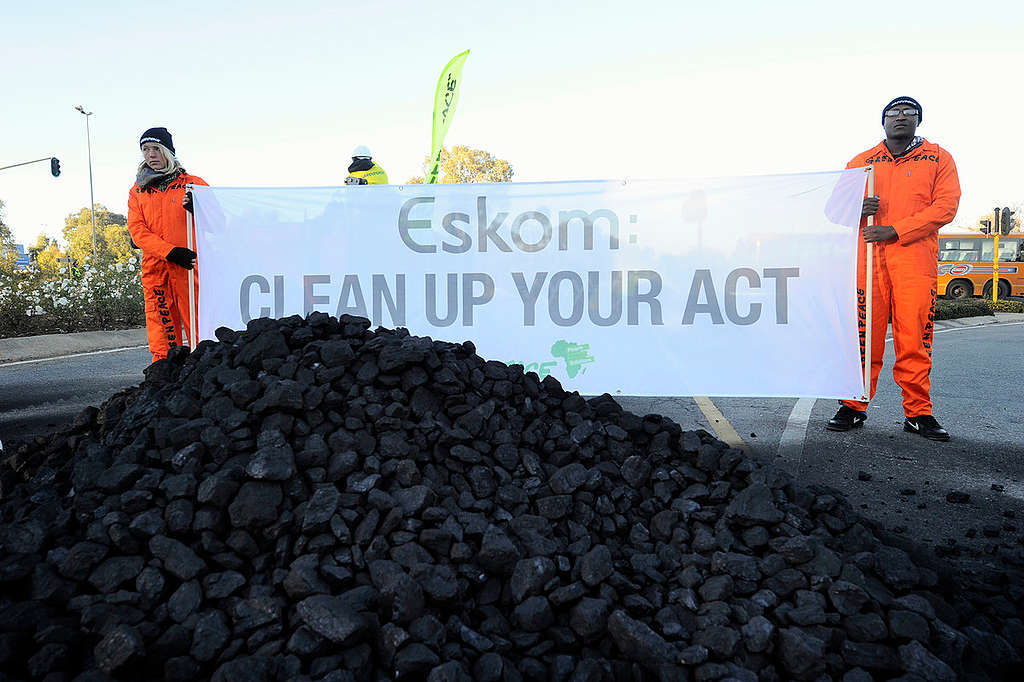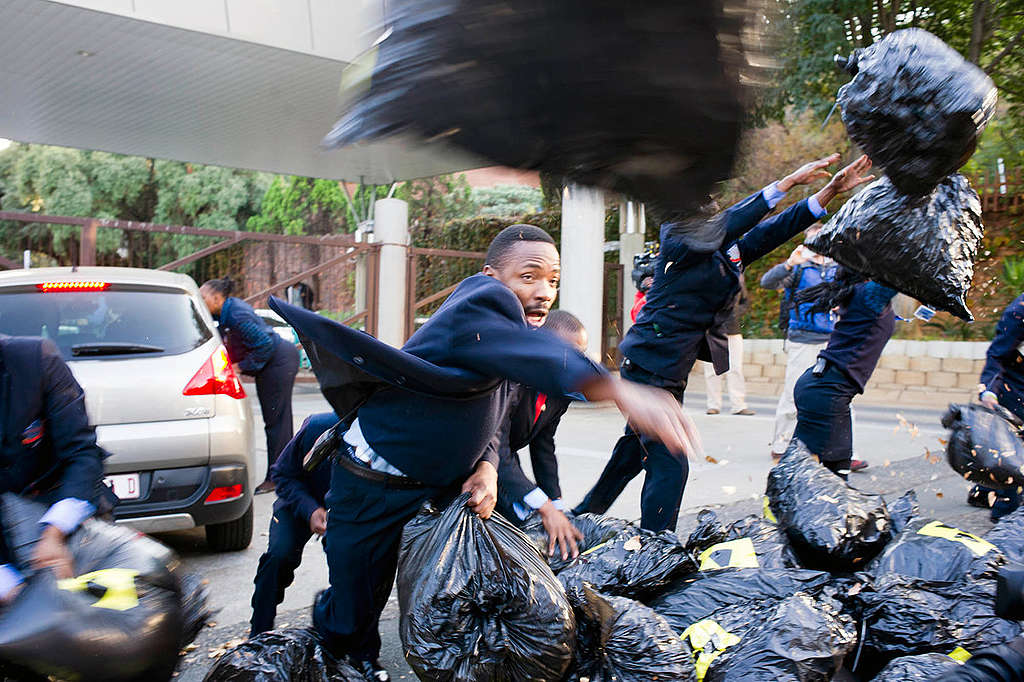
My love affair with Greenpeace Africa started in January 2011 when I joined the organisation as a full-time employee, though I had flirted with the organisation as a volunteer for a while. I was fresh out of the newsroom in Cameroon, when I traveled to South Africa and took up my Masters studies.
After a five-year run in broadcasting as a news anchor and a reporter, I was convinced that nothing could beat the adrenaline of prime time news, the pulse of the opening jingle, and the intensity of the headlines. Yet Greenpeace went beyond offering an opportunity to craft the headlines; it offered an endless supply of opportunities to inspire them, to change long-held narratives, create new ones, and change the world as we know it – the ultimate adrenaline rush.
Choosing highlights from a long list of inspiring and impactful moments is difficult, but here is my attempt to name a few.
Dakar, Senegal (2011): How Africa is Feeding Europe Report Launch
My baptism of fire in Greenpeace Africa arrived barely two months into my position as Communications Manager, with the launch of the report in Senegal. My newsroom travels had not taken me to Senegal, and to launch a report in an unfamiliar country would certainly be an adventure.
Arriving two days before the launch date and over twenty phone calls later, I was hosting a press conference in Dakar with a tent full of journalists at the World Social Forum – the ideal context to discuss the economic impact of overfishing in West African waters, the impact of overfishing on Senegalese livelihoods, and how Africa was feeding Europe at the expense of its people. Years later, this narrative is being interrogated by everyone in the country, the links between overfishing and migration having been covered by every major news agency. Local fishing communities are leading the resistance, and around the world people are .
The demands we made a decade ago are in West Africa. In 2021, that conversation has moved to something more emotive: . And I look with anticipation at what the result of this conversation will be in the coming decade.

Johannesburg, South Africa (2011): Coal dump in Eskom
When we started protesting against South Africa’s (SA) almost complete dependence on coal for energy, we looked like a bunch of rebels with no idea how economies worked. Government and corporate interest had entrenched a narrative that SA had an abundance of coal that had to be used to ‘develop’.
We challenged that development model with the country’s unparalleled abundance of renewable energy, a term that meant little or nothing to even the finest of journalists at the time. But when we dumped coal at Eskom, South Africa’s power utility, the media took us seriously. As Communications Manager, I went home that evening feeling like a heroine, with six front-page newspaper headlines on our action, and a long list of radio interviews offering us space to state our case.
Several years later, over 500 press releases down the line, SA doesn’t only know and embrace renewable energy, but everyone in my neighbourhood is saving up to install solar. And Eskom has confirmed all of our concerns around coal, which offers only ruin. With piles of scandals, , and as its legacy, many South Africans are more and more curious about the potential of a.

Johannesburg, South Africa (2012): Action at Africa Nuclear Conference
It took our first public opposition to nuclear at the African Nuclear Conference in Johannesburg for us to understand the potency of the nuclear lobby, and those who stood to benefit from nuclear expansion in Africa. Our activists were manhandled at the protest, and even journalists were brutalised. We knew this wouldn’t be easy. But who said it was meant to be? We tried convincing the public that nuclear was dirty, unsafe, expensive, and so many frames and narratives later, corruption, vested interest and the reality that nuclear was a bad choice did the magic for us. South Africa finally abandoned its nine-fold nuclear expansion plan .

The High Seas – West African Coast (2017): Chasing Off the Bad Guys
By this time, I had changed roles from Communications Manager, to Senior Communications Manager, to Head of Communication. The moment I boarded Rainbow Warrior at the port of Conakry in Guinea, I had a hunch this would be the highlight of my environmental activism. It took six days for the Rainbow Warrior to spot the first boat fishing illegally. Then, as if all illegally – fishing villains had carved a common playground, we spotted the second, the third, and by the ninth day, the sixth.
Exposing overfishing by neocolonial fleets, both Asian and European, which costs the lives of ordinary people in West Africa, thrilled me like the newsroom. But we achieved much more from that expedition. These ships had their licenses revoked, and others were banned from entering west African waters. While the West African coast is still a Wild West for all kinds of , exposing the full extent of damage caused by foreign fishing to ordinary people is changing the narrative and responsibility for proper fisheries management.
Building Back Better (2021)
With most of humanity still reeling through the COVID-19 pandemic, we are challenged to reflect on how to build back in a way that truly protects humanity. In my role as Head of Communications, I take this challenge seriously but I know there is no easy fix.
Corruption and greed are driving the climate crisis and speeding up . We are faced with threats that we have the power to reverse. The question is: How committed is humanity to doing so? Perhaps this is our next big narrative task as communicators, one to which I would love to devote the next decade.
One thing I have learned in all these years is that we are lucky if it takes a decade to see the change we desire – and we are doomed if we wait for tomorrow to start asking for it. Asking sometimes requires screaming, shouting, and screaming again. But repetition and not giving up on our convictions always seem to win the day.
This is cheers to another decade of changing narratives and asking for a better world for all!
continue our work in defending the rights of Africans to a safe and healthy environment.
Mbong Akiy Fokwa Tsafack is the Head of Communications at Greenpeace Africa based in Johannesburg, South Africa







